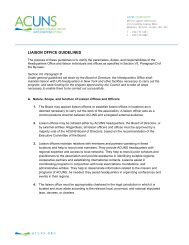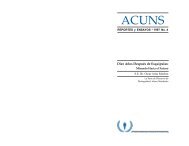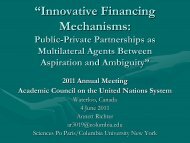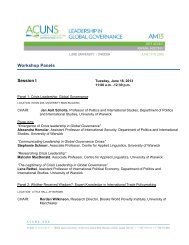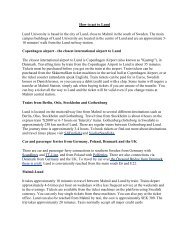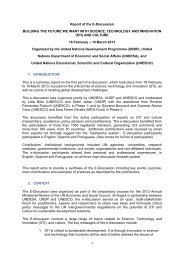THE FUTURE OF NUCLEAR ENERGY TO 2030 AND ITS ... - acuns
THE FUTURE OF NUCLEAR ENERGY TO 2030 AND ITS ... - acuns
THE FUTURE OF NUCLEAR ENERGY TO 2030 AND ITS ... - acuns
Create successful ePaper yourself
Turn your PDF publications into a flip-book with our unique Google optimized e-Paper software.
The Centre for International Governance Innovation<br />
Special Barriers for<br />
Aspiring Nuclear<br />
Energy States<br />
New entrants to the nuclear energy business face particular<br />
barriers to entry that reinforce skepticism about<br />
the likelihood of a significant nuclear energy expansion<br />
by <strong>2030</strong>. This project’s Survey of Emerging Nuclear Energy<br />
States (SENES) (www.cigionline.org/senes) tracks<br />
progress made by aspirant states from the first official<br />
announcement of interest to the connection of a nuclear<br />
power plant to the country’s electricity grid.<br />
SENES reveals that 33 states, plus the members of the<br />
Gulf Cooperation Council (GCC) collectively, have announced<br />
a “consideration” or “reconsideration” of nuclear<br />
energy at a credible ministerial level since 2000.<br />
Only three, Italy, Poland and Turkey, are considered developed<br />
countries. The first two have good prospects of<br />
succeeding in their acquisition plans, Turkey less so. Of<br />
the remainder, which are almost all developing countries,<br />
several are wealthy enough due to oil income to<br />
be able to afford a nuclear reactor on a turnkey basis,<br />
including Algeria, Indonesia, Libya, Nigeria, Venezuela<br />
and the Gulf States, notably Saudi Arabia and the UAE.<br />
But all SENES developing countries, with the sole exception<br />
of Iran, lack an indigenous capacity at present<br />
to even operate, regulate and maintain a single nuclear<br />
reactor, much less construct one. The Philippines has a<br />
partially completed reactor in a seismically-active area<br />
which it may resume work on. Among the SENES developing<br />
states, as of January 2010 only Egypt, Turkey and<br />
the UAE are known to have invited bids for a plant. The<br />
UAE has just accepted a bid from a South Korean consortium,<br />
while Turkey has recently cancelled the initial<br />
bid and restarted the process.<br />
Many SENES states have taken some preliminary steps<br />
towards acquiring nuclear energy, such as consulting<br />
the IAEA and establishing an atomic energy commission<br />
and/or nuclear regulatory authority. But these are<br />
the easiest steps and imply nothing about actual capability.<br />
Such countries would need to make unprecedented<br />
progress in their governance, infrastructure and economic<br />
situation before nuclear power becomes a feasible<br />
option, as revealed by several measurable indicators researched<br />
as part of this study.<br />
Governance<br />
A country’s ability to run a nuclear power program<br />
safely and securely is dependent on its capacity to successfully<br />
and sustainably manage a large and complex<br />
project stretching over decades ― from planning to<br />
decommissioning. This includes nuclear waste management,<br />
essentially in perpetuity. Vital requirements<br />
are an effective nuclear regulatory infrastructure and<br />
a good safety and security culture. These are not built<br />
overnight. Many aspiring nuclear energy states struggle<br />
with poor governance, corruption, the threat of terrorism<br />
and civil unrest. While one alternative is to buy<br />
an entire nuclear infrastructure, including operators<br />
and regulators, only the wealthy oil-rich states like the<br />
UAE will be able to afford this route.<br />
Infrastructure<br />
A second major barrier is having the physical infrastructure<br />
to support a nuclear power plant. The IAEA’s<br />
Milestones in the Development of a National Infrastructure<br />
for Nuclear Power lists hundreds of infrastructure targets<br />
— including physical infrastructure — that aspiring<br />
nuclear states should meet before even considering<br />
whether to commission a nuclear plant. These include<br />
roads, transportation, a safe and secure site, supporting<br />
power generators, a large water supply and waste<br />
management facilities. Reaching just a fraction of these<br />
20 cigionline.org



